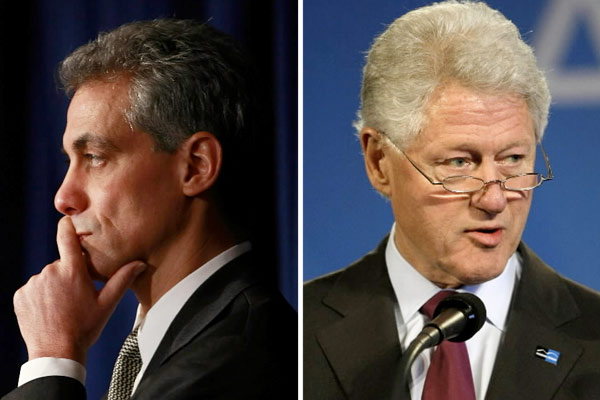
Every day that Danny Davis stayed in the mayor’s race, every day that he and Carol Moseley Braun split the fundraising, enthusiasm, and loyalty of the African-American vote, Rahm Emanuel benefited.
The news that Bill Clinton was coming to Chicago to campaign for Rahm—first reported by Politico’s Mike Allen on Christmas day and confirmed by Rahm’s campaign spokesman the following day—produced a harshly worded, almost threatening, response from Congressman Davis. Moseley Braun was silent for a day but then she chimed in angrily, calling Clinton “an outsider parachuting in to support another outsider.”
The betrayal expressed by the two black candidates, both of whom have long and complex ties to the former president, seemed to jumpstart the negotiations between the two of them—talks presided over by the Rev. Jesse Jackson, another African-American with resonant ties to Bill Clinton. The announced visit seemed to foment an us-against-them mentality and prompt the New Year’s Eve announcement that Davis was out and Moseley Braun would have the field to herself.
The race now seems to have boiled down to a contest among a white (Emanuel), a black (Moseley Braun) and a Hispanic (Gery Chico). (A second Hispanic candidate, Miguel del Valle, is running slightly under the radar; and a second African-American candidate, Patricia Van Pelt-Watkins, is running way under.) The new geography of this race makes it less likely, I believe, that Emanuel will score a 50 percent-plus vote on Feburary 22nd, the day of the nonpartisan primary. That in turn makes it more likely that Emanuel will face a runoff against Moseley Braun—suddenly a candidate to be taken more seriously—or Chico.
If someone from Rahm’s team leaked this news about Clinton to Politico, it was a serious mistake.
My guess is that Clinton, who is supposed to hit Chicago sometime this month, won’t be showing up before the first round on February 22nd after all. His appearance would only rally the base for Moseley Braun. Will he show up to help Rahm after the primary to prepare for the April 5th runoff election? My guess is no, if the runoff pits Emanuel against Moseley Braun. Furthermore, if Clinton—who hurt his relations with the African-American community by appearing to play the race card during Hillary’s primary battle with Obama—does not reach this conclusion on his own, Rahm will ask him not to come.
If the runoff is between Emanuel and Chico—whose father was Mexican and whose mother is half Greek and half Lithuanian—Clinton might show up here. In December 2006, when I was writing a book about Clinton’s post-presidency, I interviewed Chico because he had had several meetings with Clinton in Chicago, post White House, sometimes in concert with Mayor Daley.
In our conversation back then, Chico remarked twice on the closeness between Clinton and Emanuel. Chico added that, for Emanuel and only Emanuel, Clinton would even bend his usual rule of staying out of primaries. “Like all wise party leaders,” Chico explained, “they let the primary people slug it out, unless there’s a particularly strong affiliation that people have, like when Emanuel was running…. Rahm goes back to the trenches, to the Little Rock days before Clinton was president. One of the things I like about Clinton is that he’s loyal. People who worked for him he supported.”
Also, speaking of trenches, Rahm’s opponents—with the exception of Moseley Braun—have a ready-made issue about his time in the Clinton administration, and an appearance by the former President should trigger all kinds of sour memories and attacks. As I wrote last October, Emanuel was a key reason Clinton was able to get NAFTA ratified during his first term. The candidates in this mayoral race, all Democrats, will be competing for the union vote.
A Clinton appearance will be the perfect opportunity for Chico to resurrect Rahm’s role in a treaty that union members see as a reason low-wage manufacturing jobs have gone to Mexico. In an e-mail to me this morning, Chico’s press secretary wrote, “When NAFTA passed, Gery was serving as the mayor’s chief of staff leading implementation of the Neighborhoods Alive program, creating jobs, putting more cops on the street, etc. At the time, he did have concerns about NAFTA and its potential impact on Chicago workers.When Gery ran for Senate, he called for some of NAFTA’s terms to be renegotiated. ….By contrast, although NAFTA had sucked jobs out of Chicago and hurt the local manufacturing sector, Rahm Emanuel never lifted a finger to mitigate those damages when he was in Congress.”
As Emanuel told me about his role in lining up votes for NAFTA when I interviewed him in 2006 for my book on Clinton, “[NAFTA] went from being on the respirator to a success.”
Carol Moseley Braun voted for NAFTA when she was in the Senate; so she’ll have to hold her fire on this one.
Will Rahm Emanuel be the next mayor—assuming he survives the court challenge to his residency? Yes, but it won’t be as easy a path as it seemed before Bill Clinton entered the mix.
Photography: Chicago Tribune


